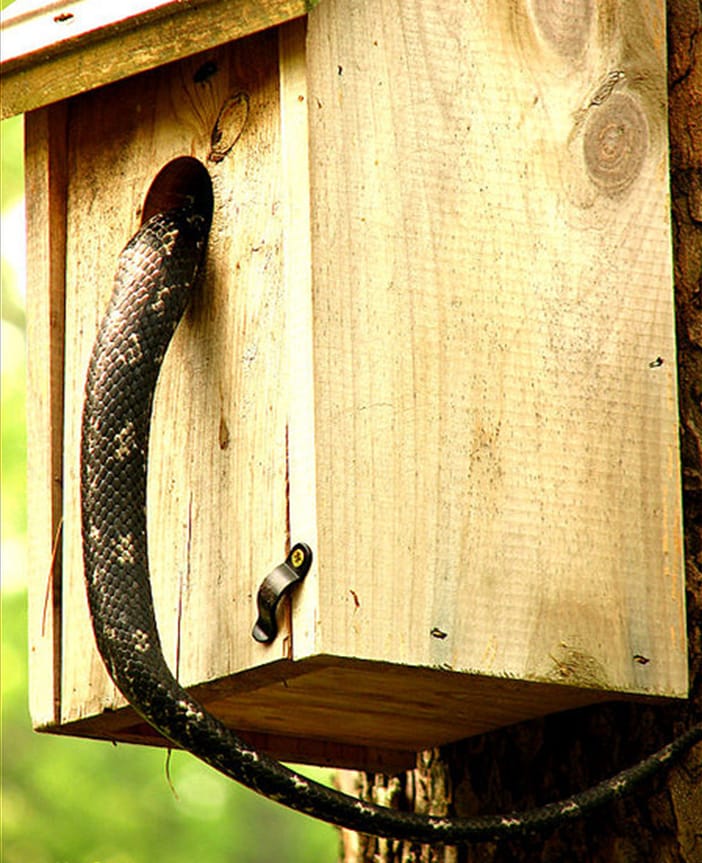Dealing with Predators
WHAT TO DO ABOUT PREDATORS
Although nest boxes provide nesting opportunities for many native birds, they also can make easy targets for predators. Common predators of nests in nest boxes include raccoons, cats, snakes, and squirrels. Here are some tips to help you thwart these common nest box predators.
The most passive way to prevent predation is to avoid placing nest boxes in areas where predators are prevalent. But, because some predators are prevalent everywhere, you should consider protecting your nest boxes with predator guards. Recent research suggests that, on average, nests in boxes with predator guards had success rates 6.7% higher than nests in boxes without guards. And while all types of guards were correlated with improved nesting success, birds nesting in boxes with cone-type baffles, stovepipe baffles, or entrance hole extenders (also called “wooden block hole guards”) were most likely to result in successful nesting (Bailey and Bonter 2017).
RACCOONS AND DOMESTIC CATS
Raccoons and cats are abundant in both rural and suburban areas. Raccoons are especially difficult to deter because they are very intelligent. Once they learn that nest boxes are good sources of food, these nocturnal creatures have been known to destroy nests in entire groups of boxes. Similarly, cats can quickly learn that nest boxes can be the source of an easy meal. When raiding nest boxes, both raccoons and cats will leap to the top of a box, sit on the roof, and “dip” into the entrance hole with their front paws to grab the eggs or young birds inside.
Ways to prevent raccoons and cats from raiding your boxes:
- Installing a roof that extends five inches beyond the front of the box will prevent these animals from easily reaching into the entrance hole from above.
- Mount your box high enough and away from trees so cats cannot spring to the top of the box in a single leap.
- Attach predator guards to your boxes to prevent these animals from climbing up from below. Three commonly used guards are shown below.
- Keep pet cats indoors.
- Do not feed feral cats. This will encourage them to stay in the area.
- Avoid leaving out pet food or bird seed that can attract predators to an area.

The Unwelcome Guest
SNAKES
Snakes are an occasional predator of eggs and nestlings, especially in southern states. A conical metal collar mounted below the box will prevent most snakes from climbing up from below, but very large snakes can occasionally circumvent these barriers. In this case, it is helpful to have a Noel predator guard installed as a backup. Also, nest boxes should be placed away from trees to prevent snakes from accessing them from overhead branches.
SQUIRRELS
In some regions, squirrels do great damage to nest boxes. By chewing at entrance holes to enlarge them, they make it easier for themselves and other predators to enter. If squirrels are common in your area, simply cut a hole the same size as the nest box entrance hole in a rectangular piece of sheet metal and attach it to the front of the nest box so that both holes line up.
A NOTE ABOUT PREDATOR REMOVAL
It’s important to remember that native predators can also benefit birds; for example, a ratsnake may consume only a few birds’ nests a year but will also consume many more rodents, which play a large role in nest predation. Some birds even selectively nest near predators because it affords them some protection against other smaller predators (this is called a protective nesting association). Additionally, state laws typically protect native mammals and snakes, and permits are needed to cull them (translocating wildlife is generally not recommended due to the risk of spreading disease).
Copyright © 2018 Cornell University
Cornell Lab of Ornithology